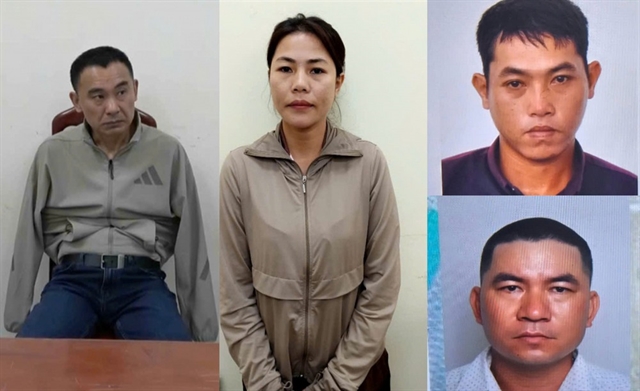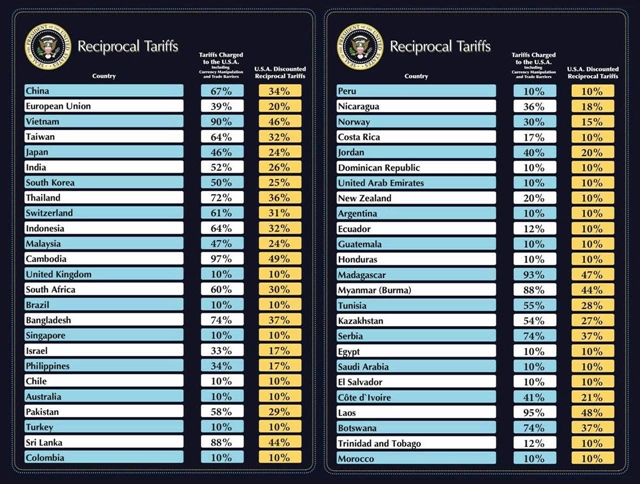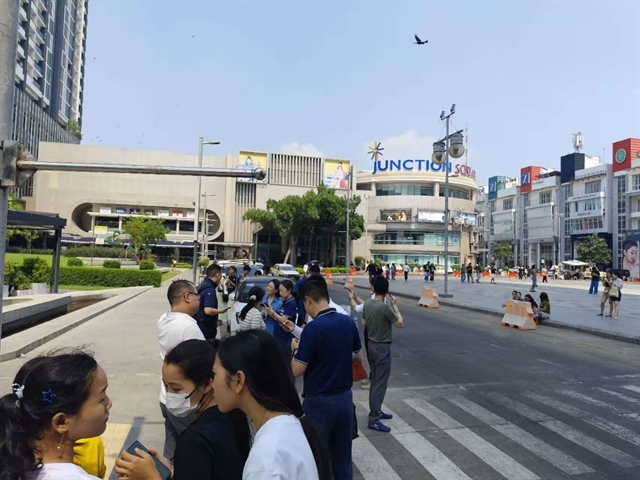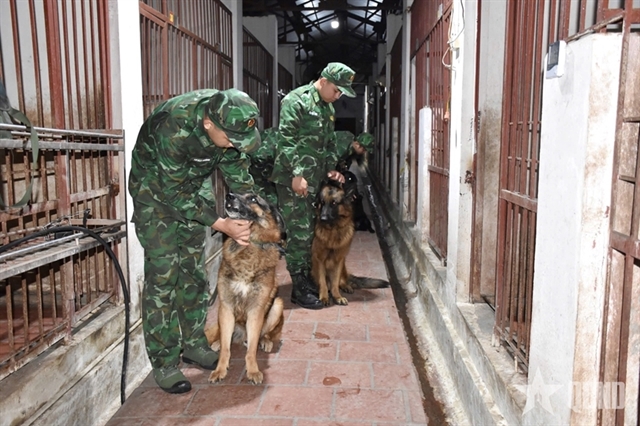

A short story by Lan Quy
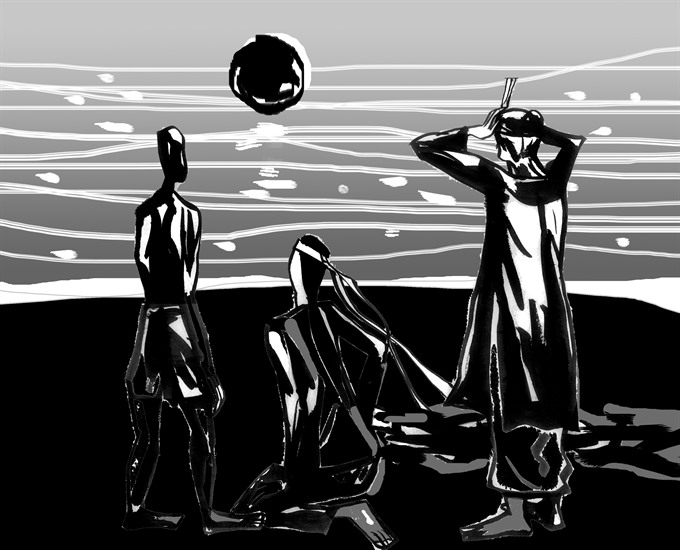 |
By Lan Quy
Sóng had rolled up a cigarette in no time. With the ocean winds battering his face, old Đội pointed down the peak, signaling to Sóng. Sóng jumped down, hid behind a slit, and flicked a lighter. The tobacco flared up in front of the old man’s nose. But no sooner was the milky smoke discharged than the tobacco was pulled out and thrown away toward the sandy beach.
Four eyes squinted and looked over the sea. Sunset was tinting the horizon pink. Waves were still jumping onto the rocks.
“There’s a ship returning, master,” said Sóng.
“Where?”
“I can see her painted eyes blinking.”
The old man rubbed his eyes and looked in the direction of the boy’s finger. There was indeed a ship returning. The waves were violent, the prow of the ship bobbing up and down. The two painted eyes up front, one red, the other white, were looking down at the sea.
“Please God, let my father be onboard,” said Sóng. Old Đội morosely glanced at the 15-year-old boy’s anxious face. The boy looked exactly like his father, a 47-year-old fisherman. Sóng stepped onto the peak, crossing his arms across his chest. His legs had grown, gaining muscle. In just two years Sóng too would go out to sea.
The painted eyes on the ship’s prow showed up more clearly, revealing the red yellow paint surrounding their whites, their irises peering into the depth of the sea, searching. The little ship crashed into shore. It was Hiền - Thu’s No. 704. Women who had been lying in wait suddenly darted out of nowhere, babbling on and on. Sóng also left the old man standing on the peak and ran toward the ship. “I don’t see my father, master!”
Sóng returned, sighing heavily. The month before, Hậu’s fishing boat was rocked by a storm in the middle of the night near Hon Che Island. Sóng’s father and nine others were onboard. Though the ship had a pair of pale white water monster eyes beaming into the sea, the sea monsters weren’t afraid. They drove waves up to rooftop height then dumped them down onto the ship.
Biển - Sóng’s father – was swept into the sea while trying to protect the nets on the deck. Only in the morning did the fishermen discover he was missing. They hoped that as a superb swimmer, Biển would drift onto Hòn Che, waiting for lifeguards. Helmsmen were dispatched straight to Hòn Che, but they drove around the small island twice without finding Biển.
Old Đội and Sóng walked back to the village, reeling.
“My mother has been crying her eyes out for a whole month. Master, please don’t go to the city yet. Stay and build a wind tomb for my father,” beseeched Sóng.
“Won’t you wait for him anymore?”
“He must be dead! No swimmer could have stayed afloat for a whole month.”
“Go and discuss with your mother. If you’re determined to build a wind tomb then I’ll prepare for the ritual.”
“Yes!”
“One more thing. Since you can ride, please go to the bus station and change my ticket for me. I’ll go to the city next Sunday instead.”
After making a clay corpse and building a wind tomb for Sóng’s father, old Đội would still go to the city with his daughter.
At the fishing village, people respectfully called him master for carrying on a family profession for more than forty years. His father was an excellent Confucian scholar and an expert in physiognomy. When he used clay to make figures to stand in for the missing bodies of those who had died at sea, he could capture their countenance, style and look, so that their wives and children could recognise them right away. Old Đội had been taught by his father, from how to make clay figures to worshipping formalities. He had made scores of wind tombs ever since and was so skilled at it that even with his eyes closed, he could imagine every detail.
Gái - Sóng’s mother - stood up upon her two shaking legs. Her pretty oval face had turned black and gaunt. She hastily took off her necklace, the most valuable remembrance that her husband had bought for her during a sea trip, and offered it up to old Đội in two hands. “Master, do us a favour, please…” Old Đội waved his hand, saying, “Please put the gold away! Let me handle this!”
The sadness in old Đội’s heart suddenly disappeared. He felt an airy intoxication similar to an ecstasy pill, which was often felt by human beings who had a clear purpose. Old Đội started feeling this way when he first built a wind tomb 49 years ago. That year his father passed away at the age of 80 and in the village six young men lost their lives to a storm at sea.
Unable to refuse the villagers’ entreaties, the 23-year-old man had to make six clay figures and six wind tombs within a week all by himself. At first he was anxious and fearful. After touching the soft clay though, an airy, ecstatic sensation arose in him and young Đội was bewitched.
The names of all the villagers who were killed at sea and offered wind tombs by old Đội were written down in an old yellow notebook. Full names, ages, missing dates, tomb construction dates were all noted down carefully. The villagers often commemorated the days their loved ones left for sea as their death anniversaries. In 42 years, 69 people in total had died at sea, including 67 old and young men in the village and two visitors who went on a sea research trip. The families of the two visitors also came to the fishing village and asked the old man to make clay figures, lay them down in coffins and take them back to their home province on the northern coast for burial. Northerners didn’t make wind tombs.
For six years and seven months, no one died at sea. The villagers didn’t seem to take note, but the master felt glad. He wanted every hardy lad who went to sea to return home. Many upheavals also befell the fishing village, threatening its survival. For instance, one ship was destroyed by a pirate ship, all the crew members were captured and everything valuable was taken.
Nevertheless, after some time life returned to normal, the crew members returned, a new ship was built, more nets were bought and luckily nobody died. Fishermen in the village faced big storms twice, twelve people fell into the sea and drifted about for several days. Yet they were blessed, being rescued by a foreign ship eventually.
Old Đội thought he could quit his profession for good now. He was about to escape the haunting reality of making male figures made of clay and listening to women and children crying. Old Đội and his wife didn’t have a son. Their four daughters were married to men from other regions, the youngest was married to one in the city.
They might have had sons-in-law with dark brown skin, vigorous health and various talents in the fishing village. Yet the old man was afraid one day he would have to make clay figures for his sons-in-law. His sons-in-law weren’t involved in fishing at all.
For the past two years, after his wife passed away, he had been living by himself in a house at the end of the village, near the coast. His youngest daughter begged him to live in the city with her, but he hesitated. At the beginning of the month when he heard his granddaughter had fallen off a motorbike and broken her leg, the old man decided to visit his daughter. He wanted to see whether the noisy, vibrant city could make him forget the wind tombs. The ticket had been booked, he would set off in two days, but Sóng and his mother pleaded with him to wait for news from Biển.
His wrinkled hands tremulously took down the notebook. The old man had wrapped it up carefully and hidden it in a tin box on an old altar, intending to bid farewell to his profession, and yet… He started a new line with a wild, veering handwriting. Full name: Lê Văn Biển, age: 47, went to sea: 21st of July in the Year of the Dragon.
Sóng drove his rickety motorbike to pick up the old man. “My mother has finished cooking the chicken, master.”
“Yeah! Wait a minute, I’ll change into my tunic.”
As they passed Bền’s store, the old man told Sóng to stop to buy votive paper, betel and liquor. If Sóng’s family hadn’t been poor, they might have cooked a pot of sweetened porridge and a pig’s head as well.
A faded nylon mattress with curled corners was spread out on the sand. The master was wearing a tunic. It was an old orange piece of garment with a few tiny holes. The worshipping ritual started. The master turned his head toward the mountain, holding up three incense sticks with two hands. Two candles flickered in the wind.
“Please Gods of the sky, the land and the seas, let me make a figure to stand in for the fisherman Lê Văn Biển,” the old man prayed. “Please guide his soul back to his body.”
Sóng stood in wait with a hoe and an empty paint bucket, his eyes turning red. The master flicked his hand to signal to the boy to follow him, straight toward the foot of the mountain. The clay hole was as wide as the mouth of a coracle, and was knee-deep. The hole hadn’t been dug up for a long time, and its brim had been corroded into a perfect smoothness by rainwater. “Fill up two-thirds of the bucket!” the master ordered. Sóng hung the bucket on the hoe’s handle, put the hoe on his shoulder, and carried it home. “While I’m praying to the Holy Midwives, you go and ask a friend to come here to help!”
The rickety bike stuttered to a noisy start, gushing smoke, bringing tears to the eyes. Arranging sticky rice, sweetened porridge and plain water on a banana leaf in front of the clay, the master prayed to the twelve Holy Midwives to come and witness the figure-making ritual for the dead. Old Đội prayed, “Holy Midwives, please let all the three souls and seven spirits* of Lê Văn Biển enter his new body, so he can return to his grave and bless his wife and kid.”
A wooden mortar and pestle were washed clean. “Sprinkle some water to soften the clay, then put it into the mortar,” old Đội requested. A pounding sound ensued, mingling with the breathing of two people. Nobody said a word. The master scooped up every handful of cotton and put it into the mortar. The pestle battered down, gradually turning the white mixture into brown, flexible and soft like flesh. The old man had prepared a bundle of mulberry stalks. They were used to make seven ribs, eight hand and foot bones, as well as all finger and toe bones. A chicken egg was used to stand for the heart, and green and red threads represented the blood vessels. Old Đội said, “Remove all the clay carefully for me. Don’t leave out even just one bit! Take a bite of the sweetened porridge, then go home. In the afternoon, Sóng and your mother come here to pick up the figure!”
Making clay figures was the most tedious part of the profession, because no one was allowed to come near him. The master focused on the powdered clay and the different expressions of the dead. Now he was intently sitting by himself under a canvas top, trying to imagine the face of Sóng’s father. He was able to capture the spirit of the dead. Sunshine beamed, illuminating the red tunic. He sweated profusely, swaying like he was possessed.
Biển had a hot temper, bushy dark eyebrows, squinting eyes and a contemptuous sneer. He had a bad tongue but a heart of gold, easily lost his temper yet generously pampered his wife and kid and helped any friend in need. Thus his eyebrows looked fierce but his square face gentle. Biển showed up in the old man’s mind, helping carry a coracle to shore, his muscles curling up powerfully under the lever.
Then there were a pair of slanting eyes, a disdainful smile that appeared on Biển’s face when he talked with the fish wholesaler who always drove a hard bargain with the fishermen, and two big hands that closed tightly into fists but opened up on second thought. The look of the dead gradually emerged under the hands of the master. The head and face came to life, followed by the wide, well-developed chest, and a pair of brawny arms and big rough feet with toes spreading and clinging hard to the side of the boat.
*
The sun set, tinging the horizon above the sea a pinkish purple. Coracles drifted to shore. Some fishermen stood onboard, rowing nimbly, turning their eyes toward the high top of the coconut trees, reading clouds to predict the weather the following day. Sóng and his mother took four people along. The two daughters came home from school, their bags still hanging on the handle-bars of their bicycle. They all lined up in dead silence. Đội lifted up the white cloth covering the clay figure, and the mother and the three children cried out loud: “Oh dear! Oh father!”
The figure looked exactly like Biển. Gái looked desolate, yet a gleam of hope flickered in her eyes. “We’ll start the worshipping ritual at 3am tomorrow!” The master declared, then asked Gái to prepare a baked fish, a crab, a plate of raw shark meat and vegetables, a bowl of rice and a bowl of salt. Gái had sold the gold necklace and bought a good coffin for her husband. With little money left, she would prepare some food and drink to invite the villagers to come and pay their respects.
With a three-beat drumming and resounding gong, the funeral woke up the little fishing village. There were no tears, only the suppressed hiccups of Gái and her children. Sóng walked behind the master and held his father’s picture in two hands with dry eyes. A fisherman was taking shape in him, following his ancestors’ footsteps.
The light coffin carried on the shoulders of ten men sometimes felt overloaded as if the soul of the dead had entered the body. The village hadn’t witnessed a wind tomb funeral for a long time. The villagers woke up, remembering the debt of the sea. The procession with the flags slowly walked on the path between two budding corn fields, the lipstick red coffin floating along. The grave was very deep, revealing spotted yellow-and-brown sandy soil. It was the 70th wind tomb in the graveyard.
*
The city was more bustling and noisier than old Đội imagined. His granddaughter rested at home and was cared for by a housekeeper. His daughter and son-in-law worked past noon, and only came home at dusk. He was bored to tears watching TV all day, and could only speak a few sentences to his granddaughter because she kept looking down at her iPad which looked foreign to him. He went out for coffee twice and was terrified. The sounds of vehicles and people, the smoke, the dizzy speed all made him feel like he was about to be pulled into a hurricane. He wanted to phone home but didn’t have anyone’s number. “How stupid I was! When I left I gave Sóng my daughter’s number but forgot to ask for his.”
Twenty days dragged by heavily. Rice and soup, meat and fish all tasted bitter to him. Old Đội only drank cold water. One morning he woke up and found his body burning with a fever, completely worn out, ready to drop dead. The housekeeper had gone to market, and his children had gone to work. He staggered into his granddaughter’s room. She was resting her dazzling white leg which was cast in plaster on a side rail of the bed, still clutching her iPad. The phone rang shrilly. “The phone is ringing, grandchild!”
The girl didn’t look up but spoke loudly, “Grandpa please pick it up for me!” Hearing what sounded like sea waves, old Đội lit up. “Hello! Who’s that? My children have both gone to work.” A man replied, “Oh master! It’s me, Sóng! Foreign ships are making trouble again. A ship from our village has sunk at sea. Two people are missing, and we’ve been searching for them in vain. Please return master!”
No matter how hard his daughter and son-in-law insisted, old Đội refused to stay. “I must return. I must return quickly! I can’t abandon the fishing village.”
Sitting aboard a night bus, the old man anxiously looked ahead with searching eyes, even though he was still more than 200 kilometres from home. In his head he heard the sea roaring, and human beings calling out to each other in the dark. God! Wind tombs seemed to rustle in the wind, haunting him, calling him back.
Translated by Thùy Linh
*In Vietnamese folk beliefs, a man has three souls and seven spirits, and a woman, three souls and nine spirits.

